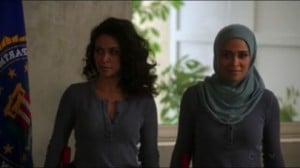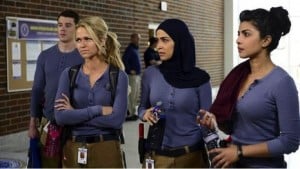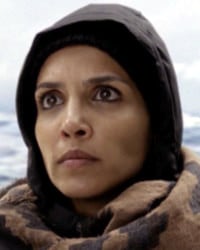Yesterday, PBS aired a special called Stand Up: Muslim American Comics Come of Age. Maysoon Zayid and Tissa Hami are two Muslim women comics profiled in the documentary, and Muslimah Media Watch was lucky enough to get interviews via email with them both.
Muslimah Media Watch: Salaam waleykum. I want to say first that it’s a great opportunity to interview you, even via email. You do incredible work in your personal lives and through your comedy. May God reward you both.
Maysoon: Yislamoo. I have gotten such incredible love and support from my sisters such as you in the community, and it makes me proud, to be given the opportunity to represent us in a positive light. Really, thank you. Do you have a son? I’m looking for a decent mother-in-law.
MMW: How do you work to dispel different stereotypes about Muslim women in your comedy?
Maysoon:The most obvious thing I do is I don’t wear a burqa and I’m definitely not oppressed. Plus I’m quite obviously an independent thinker which means as soon as I walk on stage I dispel a lot of those stereotypes. That and I make sure to tell people that Sally Field, in Not without my daughter does not speak for me, because it is so ridiculous.
Tissa: By getting onstage and speaking up and speaking out and being funny. There is this perception that Muslim women are silent and subservient.
MMW: Is it your intent to “play ambassador” and represent Muslim women through your comedy? Do you seek to represent only your specific ethnic/nationality group or sect of Islam? Why or why not?
Maysoon: It is truly a dream of mine to do just that. I would love to have the opportunity to travel more widely and be a good will ambassador. I would love to be able to focus on the positive aspects of my faith, such as charity. I mean Maysoon’s Kids is such a huge part of my life, and the genesis of that charity was the concept of Zakat combined with inspiration from Oprah’s Christmas kindness program. That alone illustrates that I live with one foot in each world. That all being said, I’m an anarchist at heart; so I’d much rather be a goodwill ambassador for humanity at large, regardless of religion, ethnicity, or height. (I’ll probably just end up on General Hospital)
Tissa: I am a comedian. My intent is to be funny. I’m not out to represent anybody. The only person I represent is myself. If people can relate to what I say onstage – no matter their race, creed, or nationality – then that’s great. If not, then that’s okay too.
I’ve been surprised by the wide range of people who are able to relate to my jokes. When I first started out, I was afraid I might only appeal to other Iranian-Americans of my generation. What I’ve found is that many people relate to the ‘fish out of water’ story, so to speak. I had a white Christian woman from Texas tell me that she related to my joke about having people tell me to “go home”, because when she first moved from Texas to the North, people would hear her accent and tell her to go back to where she came from. I had another woman who was the only Catholic in an all-Protestant town tell me that she related to my stories about being an outsider. So again, if people can relate to what I say, that’s great.
MMW: I know that you draw on 9/11 as a large source of inspiration for the drive to do your comedy projects. Are there specific people from whom you draw similar inspiration?
Maysoon: I don’t draw on 911 for any of my inspiration. I live in Cliffside Park. I saw the towers every single day of my life, and it’s one of the few things I choose not to be yuk yuk about. I draw inspiration from my dear Daddy, who I love more than lunch meat, my kids in Palestine, who treat hair gel the way a crack whore treats crack. The insanity of the occupation. Dave Mathews. Adam Sandler. Dean Obeidallah. And as cheesy as it sounds, Mariah Carey, but we’ll talk about that later. Oh. and Suhair Hammad, because the risks that she takes on stage, are always earned and she has such an incredible respect for her audience. So I’ve drawn a lot of inspiration form her work.
Tissa: Yes, from my two favorite comedians – George W. Bush and Mahmoud Ahmadinejad.
MMW: When you give interviews or speak to non-Muslim audiences about your experiences as Muslim women, do you feel you’re expected to live up to ideas they may have about Muslim women? Do you feel these outlets take your voice seriously even though you might not look like what most non-Muslims think of when they think of a Muslim woman?
Maysoon: I like to screw with people’s perceptions. I don’t represent all Muslim women. But
neither does the crazy woman who keeps calling me a slut on YouTube. I’m not trying to represent all Muslim women. I’m trying to give voice to the silent majority. Unfortunately, I’m a bit loony.
Tissa: In general, non-Muslim audiences take me for who I am. It’s the Muslims who have loads of expectations and who are the biggest critics. What I like to tell any critic is, look at what I do. It’s just me and a microphone. If you have something to say that’s different from what I have to say, then by all means, grab a microphone and get onstage and make your voice heard.
MMW: Maysoon, because you visit Palestine so often, I’m assuming you have very traumatic and horrific experiences with all sorts of security stations. Is this fodder for your routine as well? Do you use your comedy to work through this?
Maysoon: Listen. If it were not for comedy, every plate [and champagne flute] in my house would be shattered in a million pieces. Comedy is free therapy. And if it’s done well the audience and the comic take turns being the doctor as well as the patient. Laughter heals. Zogby did a poll. Believe me.
MMW: Your image may not coincide with a lot of people’s ideas of what a Muslim woman is. Do you think that helps or hurts the messages you’re sending?
Maysoon: Both. You know not wearing hijab has seriously seriously hurt my career. Mass media wants to see a woman in a veil. But I think it helps me, because it makes it easier for my audience to relate to me. I’m not the scary ‘other’ they keep seeing on Fox News.
Wow, I answered the same question fifteen different ways. It’s kinda like being interrogated by security.
MMW: You’re often portrayed as the “underdog” because of your Palestinian heritage and living with cerebral palsy. Do you feel like the underdog, or does that label bother the hell out of you?
Maysoon: Sigh…I’m 30. Single, and I live with my mother and my cat in New Jersey. So yeah I’m the underdog. But I’m like the Giants in the last 2 minutes of the Superbowl type of underdog. I got a PBS special, an Adam Sandler movie and 732 disabled orphaned refugees who depend on me. So I’m blessed and don’t mind being called an underdog as long as I keep winning Masha’allah. Thanks for the great questions. If you’d like more info on me or my charity check out www.maysoon.com. Salam.
MMW: Tissa, In the PBS special, you talk about removing your headscarf during performances to illustrate that you’re just the same woman with or without it. If you decided to wear it the entire show or not wear it at all, how do you think this would affect your comedy?
Tissa: I have done both – many times (and mainly when I have shorter sets, since I don’t have enough time to perform with the hijab and then remove it). The bulk of the jokes have nothing to do with how I’m dressed, so they work with or without the hijab.
MMW: By using the headscarf in your routine, what messages are you trying to convey?
Tissa: That not all veiled Muslim women are silent or oppressed or subservient or terrorists. That a veiled woman isn’t someone to revile or fear. I was in Iran last month for my aunt’s funeral, and when I was there, I dressed in hijab every day because that’s the law. It didn’t change who I am. I was still the same person with the same ideas, opinions, and thoughts. And that’s what I’m trying to show – that whether I’m veiled or not, I am the exact same person.
MMW: In an article you wrote for iranian.com in which you chronicle your double life as a stand-up comic and an administrative assistant, you state that you’ve received accolades you didn’t deserve and opportunities you didn’t earn. Is this just Iranian ta’arofing (over-politeness)? When you obviously work so hard at your job(s), why do you feel you aren’t deserving of the praise presented to you?
Tissa: What I meant is, if lots and lots of female Muslim stand-up comics had come before me, then no one would even notice me. It’s only because I’m one of the first that people pay so much attention. Trust me, in 20 years, no one will be making a documentary about female Muslim stand-up comic #150. 😉
Be sure to check out an interview with all the comedians on ArabComment.











